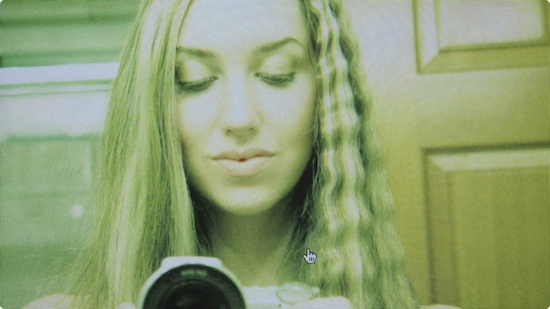 |
| (Megan Faccio in Catfish/dir. Henry Joost, Ariel Schulman, Rogue Pictures) |
The film really gets weird right from the get-go, after Nev Schulman, a New York-based photographer who had a picture of a dancer published in The New York Sun, begins a Facebook friendship with a young girl from Michigan—eight year old Abby—who has sent him an extraordinary painting of his photograph. The Beach Boy’s ‘Good Vibrations,’ as rendered by a chorus of children plays over the frantic imagery of Facebook. The voices of these children—singing a lightly suggestive pop song—add a perverse dimension to the inherent strangeness of a 24-year old talking to an eight year old online. Yet what is more astonishing is that it seems, initially, to be all good and then some. Nev begins talking to Abby’s mother Angela, on both Facebook and the phone, and soon is introduced to Angela’s stunningly beautiful daughter Meg, with whom he begins an online romance that soon crosses the limits of mere flirtation. Abby paints more of Nev’s photographs, each one indicating that she is a child prodigy. Megan is a farm girl who records him songs whenever he wants her to. All of it is captured on camera by Nev’s brother, Ariel, and their friend, Henry Joost.
That all this elaborate shadiness is fully engaged, even enabled, by Nev is an indicator that he, Ariel and Henry had an idea of what they were getting in to all along. It also raises questions about Nev’s own grasp of ethics. So it does not come as much of a surprise when, less than halfway through the film, the legitimacy of some of the claims this family is making come in to question.
It is at this point when Catfish morphs in to a detective story. This is not its final transformation, but it is the high point of the film. Nev and his friends are amateur detectives, but that’s all they need to be; the Internet will do most of the research for them. It is just when their findings yield a situation that any normal person would walk away from then and there, that the three of them decide to stop by Ishpema, Michigan, where the family resides. Their journey yields a final twist that is far from unbelievable, yet still very weird. But prospective viewers should not think this twist will bring the film in to horror film territory, complete with a homicidal maniac, rapist, or any situation where Nev’s life is put in danger. In its final act, the film simply enters an entirely new investigation, one which, unfortunately, the filmmakers fail to truly probe. The amateur detectives turn in to non-investigative journalists. They are so wowed by their discoveries that they miss what their discoveries imply about our modern society. Once it is all over, it feels as though Catfish could have easily been a literary work; part-memoir, part journalism, rather than a film.
In any case, Catfish is an almost too clever film. Although Joost and Schulman do their best to find poetry in online imagery, it all looks like neat editing. Although they appear to have shot the film on two different digital formats, there is nothing particularly cinematic about the movie. Despite this, there are images from Catfish that will depress any Internet user (read: modern man) for some time. Although the film’s legitimacy has come in to question—some claim that this is not a documentary at all—this is a moot point, because Catfish adheres to documentary standards in the truest sense. The point of documentaries, from the time Robert Flaherty visited the Eskimos, has not been to capture authentic, un-staged action, but to cover a real phenomena in a social setting (i.e, internet networks) and its real outcome (i.e, the final third of this film) and let us decide on whether this a tragedy, comedy or drama for the real world. Catfish doesn’t follow through as well as it should. The best it does is hold a mirror up to the three self-absorbed hipsters who got involved in such a mess, thereby holding a mirror up to the rest of us e-weirdos. When we log online, we all become demented. That is its real world tragedy. But who is it that acted more demented in this story? Was it Henry and his friends? Or was it--- ?
 |
| (Henry Joost, Ariel Schulman and Nev Schulman in Catfish) |